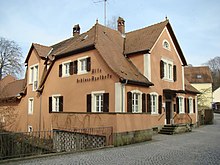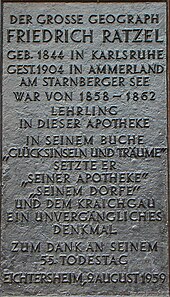Friedrich Ratzel
Friedrich Ratzel (born August 30, 1844 in Karlsruhe , † August 9, 1904 in Ammerland on Lake Starnberg ) was a German zoologist and geographer . He is commonly (albeit wrongly) considered the founder of anthropogeography , diffusionism and political geography, as well as an influential pioneer of geopolitics .
Life
Friedrich Ratzel was the youngest of four children of his father Carl Ratzel, who served as a valet at the court of the Karlsruhe margrave. Protected and carefree, he grew up in the family of court officials. After finishing school he began training as a pharmacist in Eichtersheim . After taking his pharmaceutical exam in 1863, he worked as a pharmacist's assistant for a few years. At this point his interest in the natural sciences and philological studies grew. Finally, at the age of 21, he studied geology and zoology in Heidelberg , Jena , and Berlin . In 1868 he received his doctorate in zoology at the University of Heidelberg .
Lack of money finally forced him to send his Mediterranean travel letters to the Kölnische Zeitung from one of his travel destinations in the south of France . Ratzel's travelogues were well received by the newspaper's readership and so he was hired. He went on further study trips to Italy , Cuba , Mexico , Hungary and the USA . In 1871 Friedrich Ratzel went to the Technical University of Munich to continue his scientific studies. Geography became more and more important to him. Ratzel completed his travels in 1875 and began working as a private lecturer in geography at the Technical University of Munich. A year later he received an extraordinary professorship in geography. During his work in Munich he published, among other things, his works Die Erde in 24 public lectures on general geography (1881) and The United States of America (2 volumes, 1878-1880). His works marked the beginning of anthropogeography as a separate discipline.
In 1877 Friedrich Ratzel married a travel acquaintance from England, Marie Wingens. His daughters Hedwig and Lila were born in 1879 and 1881. In 1883 he was elected a member of the German Academy of Sciences Leopoldina and in 1885 a corresponding member of the Bavarian Academy of Sciences . In December 1886 he was accepted as a full member of the Royal Saxon Society of Sciences .
In 1886 Friedrich Ratzel was appointed to the University of Leipzig . He received the chair for geography, which was available after Ferdinand von Richthofen left . For the next 18 years, Ratzel was to research and work in Leipzig. He found influential friends in the economist and historian Wilhelm Roscher , the chemist Wilhelm Ostwald and the psychologist and philosopher Wilhelm Wundt . He campaigned for the expansion of the library and the expansion of the seminar business. Because of its popularity with the student body, the number of listeners to his geographic lectures rose rapidly. He was a member of several geographical societies as well as on the board of the Leipzig section of the German Colonial Society . He was also involved in the “Pan-German Association” and the “Association for Fleet Policy”. In a study from 1901 he coined the term “living space”, which the National Socialists later adopted.
Friedrich Ratzel died shortly before his 60th birthday, on August 9, 1904, during his summer vacation in Ammerland on Lake Starnberg , while he was still doing his scientific work and teaching . A memorial plaque was attached to his birthplace in Karlsruhe (now Kaiserstraße 123) in 1927.
meaning
Ratzel is generally considered to be the founder of anthropogeography and political geography . This is correct insofar as his writings gave the field of anthropo- or human geography a great deal of international attention. But he had neither coined nor circulated the terms “anthropogeography” or “political geography” - both had been in use since the 1840s - nor was Ratzel breaking new ground with his ideas in this regard. Rather, his work was preceded by the works of Wilhelm Butte , Johann Georg Kohl and especially Hermann Schaaffhausen , all of which in one or more writings thematize in detail the interactions between earth, nature and man and also the human cultural achievements or the human being in geographical considerations had included; from the beginning there were also close relationships with racial theories and with the still very young evolutionary theory of Darwin.
Ratzel saw the description of the interactions between nature and humans as a central task of anthropogeography. In this way he hoped to gain an understanding of larger interrelationships and laws. Ratzel assumed the unity of mankind:
“As far as the earth is inhabitable for humans, we find peoples who are members of one and the same humanity. The unity of the human race is thus the telluric or planetary characteristic that is expressed in the highest level of creation. There is only one kind of human being, the variations of which are numerous but small in amount. "
As one of the most important pioneers of geopolitics in Germany, Ratzel orientated himself strongly on Charles Darwin's theory of evolution and social Darwinism . For the description of the development of states he leaned on biological terminology; Ratzel compared the state to a biological organism. He explained the growth (and shrinkage) of states with the “law of growing spaces” and linked it with Darwin's “struggle for existence”. For him, wars were the "rapid experiment" that decided the future of peoples and their role in history.
These ideas by Ratzel, which were later further developed by numerous geographers and instrumentalized by Karl Haushofer , are considered to be an important impetus for the “ living space ” ideology under National Socialism .
Works
- The United States of America. 1878-1880.
- Anthropogeography. The geographical distribution of man. 1882-1891.
- Ethnology. 3 volumes, Bibliographisches Institut, Leipzig 1885–1901 ( Volume 1 , Volume 2 and Volume 3 in the Internet Archive ).
-
Political geography , R. Oldenbourg, Munich and Leipzig 1897.
- Reprint of the 3rd edition from 1923, Zeller, Osnabrück 1974, ISBN 3-7648-0562-5 .
- Germany. Introduction to local history. 1898.
- The earth and life. 1902.
- About portrayal of nature. 1904; expanded and revised new edition: About nature and landscape portrayals. A common guide. Mahler, Stühlingen 2012, ISBN 978-3-941212-01-5 .
- Earth power and the fate of the people. A selection from his works. Edited and with an introduction by Karl Haushofer . Kröner, Stuttgart 1940.
- Islands of happiness and dreams. Collected essays from the border messengers. Ms. Wilh. Grunow, Leipzig 1905.
- Childhood memories. Edited by Friedhelm Kemp. Kösel, Munich 1966.
literature
- Hanno Beck : Friedrich Ratzel - the great stimulator of anthropogeography (= human geography) (1844–1904). In: Hanno Beck: Great Geographers. Pioneers - outsiders - scholars. Dietrich Reimer Verlag, Berlin 1982, ISBN 3-496-00507-6 , pp. 164-179.
- Andreas W. Daum : Science popularization in the 19th century. Bourgeois Culture, Scientific Education, and the German Public, 1848-1914 . 2nd, supplementary edition, Oldenbourg, Munich 2002, ISBN 978-3-486-56551-5 .
- Günther Buttmann: Friedrich Ratzel. Life and work of a German geographer 1844–1904 . Scientific publishing company, Stuttgart 1977.
- Paul L. Knox, Sallie A. Marston: Human Geography . Spektrum Akademischer Verlag , Heidelberg 2001, p. 443 ff.
- Gerhard H. Müller: Ratzel, Friedrich. In: New German Biography (NDB). Volume 21, Duncker & Humblot, Berlin 2003, ISBN 3-428-11202-4 , pp. 186-188 ( digitized version ).
- Peter Schöller : Geopolitical Temptations in the Interpretation of Relationships between Space and History. A critical assessment of the concepts and theories since Friedrich Ratzel. In: Dietrich Denecke , Klaus Fehn (ed.): Geography in history (= geographic knowledge. Issue 96). Franz Steiner, Wiesbaden 1989, pp. 73-88.
- Hans-Dietrich Schultz: Herder and Ratzel: Two extremes, one paradigm? In: Erdkunde , Vol. 52 (1998), H. 2, pp. 127–143 ( digitized version ).
- Hans Dietrich Schultz: “If only the earth had more space!” Friedrich Ratzel and his (political) geographical view of the world. In: Mitteilungen der Geographische Gesellschaft München , Vol. 89, 2007, pp. 3–45.
- Hans-Dietrich Schultz: Friedrich Ratzel. Bellicistic spatial theorist with a feeling for nature or forerunner of Nazi habitat policy? In: Claus Deimel, Sebastian Lentz, Bernhard Streck (eds.): In search of diversity. Ethnography and geography in Leipzig. Leibniz Institute for Regional Geography, Leipzig 2009, pp. 125–142.
Web links
- Literature by and about Friedrich Ratzel in the catalog of the German National Library
- Works by Friedrich Ratzel in the Gutenberg-DE project
- Friedrich Ratzel in the Internet Archive
- Overview of Friedrich Ratzel's courses at the University of Leipzig (winter semester 1886 to winter semester 1904)
- Friedrich Ratzel in the professorial catalog of the University of Leipzig
- Estate in the Bavarian State Library
Individual evidence
- ↑ Friedrich Ratzel's membership entry at the German Academy of Sciences Leopoldina , accessed on February 5, 2016.
- ^ Member entry by Friedrich Ratzel (with picture) at the Bavarian Academy of Sciences , accessed on February 5, 2016.
- ↑ a b c Manfred Koch, memorial plaque for a geographer, in: Blick in die Geschichte (Karlsruhe urban history contributions) No. 102, March 21, 2014.
- ^ Wilhelm Butte: Basics of the arithmetic of human life, together with waves for their application to geography, state and natural science, together with IX tables . Landshut 1811.
- ^ Johann G. Kohl: The traffic and the settlements of the people in their dependence on the design of the earth's surface . Dresden 1841.
- ^ Hermann Schaaffhausen: "The nature and morality of the peoples" . In: German quarterly font . tape 1 . Stuttgart – Tübingen 1850, p. 179-228 .
- ↑ Hermann Schaaffhausen: "About the development of the human race and the ability of its races to educate" . In: German Museum . No. 5 , January 28, 1858, p. 161-172 .
- ↑ Hermann Schaaffhausen: The struggle of man with nature. A lecture given on February 1, 1865 in Düsseldorf . Separately printed, Düsseldorf 1865.
- ↑ Hermann Schaaffhausen: "The teaching of Darwin and the anthropology" . In: Archives for Anthropology . tape 3 . Braunschweig 1868, p. 259-266 .
- ↑ Meeting reports of the Saxon Academy of Sciences in Leipzig, 1888, p. 322.
- ↑ Hans-Dietrich Schultz: Unlimited longing for power. German geographers as warmongers in the First World War. In: Der Tagesspiegel , December 11, 2014, p. 28.
| personal data | |
|---|---|
| SURNAME | Ratzel, Friedrich |
| BRIEF DESCRIPTION | German zoologist and geographer |
| DATE OF BIRTH | August 30, 1844 |
| PLACE OF BIRTH | Karlsruhe |
| DATE OF DEATH | August 9, 1904 |
| Place of death | Ammerland on Lake Starnberg |




